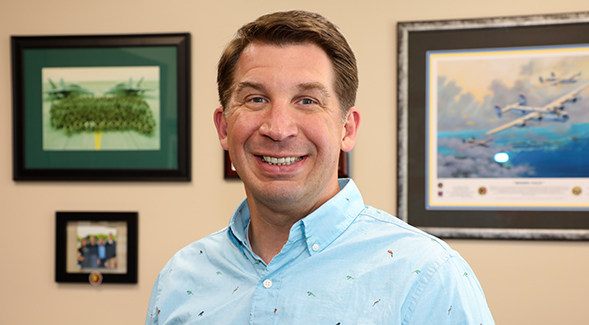SDSU Veterans Center Director Selected to Help Post-9/11 Veterans
The George W. Bush Institute has picked Derek Abbey to participate in a select leadership initiative that could help SDSU expand its highly rated military outreach.

“This opportunity allows me to work with people that have been very successful in military circles from across the nation, and get some additional perspective.”
Derek Abbey learned all about San Diego State University’s support for veterans while researching a master’s thesis at the University of San Diego nine years ago.
The former Marine aviator’s case study spotlighted SDSU’s best practices on serving military-connected students and their families and has been used to support similar programs on college campuses across the nation.
Today, as interim director of SDSU’s Joan and Art Barron Veterans Center, Abbey heads up the operation he previously studied. And he hopes to help bring continued expansion and improvements to the military program as a participant in a select leadership initiative established by former President George W. Bush.
Abbey is one of 43 scholars accepted for the 2019 Bush Institute Stand-To Veteran Leadership Program, which seeks to bring together representatives of different sectors to increase their impact in helping post-9/11 veterans.
It’s the second year for the program, which meets for three to four days a month from next week until October, gathering in Dallas, Seattle and Washington, D.C.
In military parlance, “stand-to” is short for stand-to-arms, a reference to the state of readiness expected of troops on the ground. Applicants submit proposals for the projects they expect to work on and finalists are interviewed before the scholars are selected.
“My goal is to keep San Diego State on the leading edge when it comes to being the ideal program in higher education for serving our military,” Abbey said. “We just need to continue to be innovative in our approach and get out in front of things.”
“What I would like to do is create this education and research center for our military that addresses a lot of the gaps that are out there,” he added.
“This opportunity allows me to work with people that have been very successful in military circles from across the nation, and get some additional perspective, additional input, as well as the support of the George W. Bush Institute in developing this program.”
Marine veteran
Abbey himself is a combat veteran. He joined the U.S. Marine Corps straight out of high school in Seattle, quickly being sent to a commission program at Oregon State University. He was then selected for flight school and became a weapon systems officer in F-18s, deployed both to Iraq (three times) and Afghanistan before retiring in 2014 with the rank of major. Other duties during his 23 years with the Marines included running a schoolhouse for military instructors.
The veterans center, which operates from a large office on the south end of the Student Services West complex, accounts for much of SDSU’s lofty reputation in veterans’ circles. SDSU has been ranked as one of the nation’s top universities for veterans by Military Times, which considers such factors as services and the veteran culture on campus. Currently, SDSU has about 4,000 veterans and military-affiliated students.
Abbey said he selected SDSU for his thesis, which brought him to the campus as an intern for the 2010-11 academic year, because “they were doing it right and I wanted to see what they were doing.”
The center assists with admissions for active-duty military, veterans and their families, helps make connections to the broader community through its Military Ally program, and provides a quiet “bunker” for students to study or relax. Among additional services, the center works to counter “predatory” tactics of universities that lure in veterans with deceptive practices, and doesn’t limit its reach just to prospective Aztecs.
“We conduct outreach to military students in general,” Abbey said. “It’s student-focused—where are you, where are you trying to go and what’s the best path for you to do that? And arm those students with information so they are less likely to be susceptible to some of the practices of these other institutions.”



